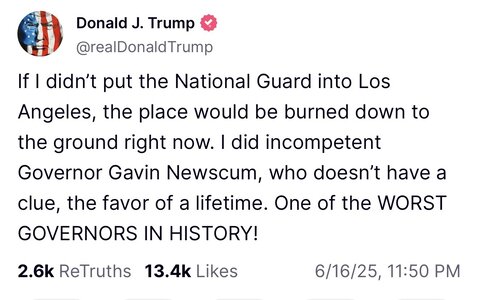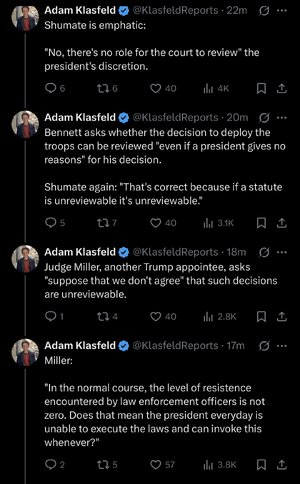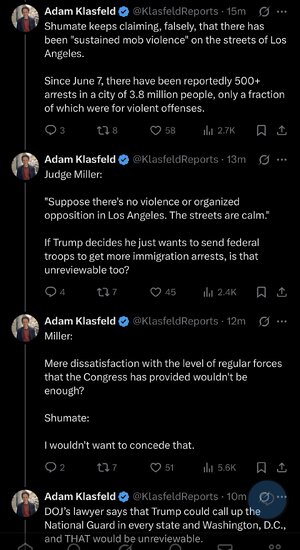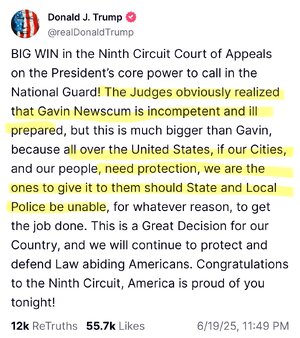Navigation
Install the app
How to install the app on iOS
Follow along with the video below to see how to install our site as a web app on your home screen.
Note: This feature may not be available in some browsers.
More options
You are using an out of date browser. It may not display this or other websites correctly.
You should upgrade or use an alternative browser.
You should upgrade or use an alternative browser.
America's Reichstag fire???
- Thread starter BillOfRights
- Start date
- Replies: 400
- Views: 8K
- Politics
StrangePackage
Iconic Member
- Messages
- 1,551
superrific
Legend of ZZL
- Messages
- 8,462
This hearing is not going well. Trump judges are hassling the CA attorney on niggling points. They claim to be bound by dicta from an 1827 case, which is preposterous. That case involved a militiaman who didn't want to be mobilized DURING THE WAR OF 1812. And his justification was that the militia wasn't needed. Well, duh. Of course the militiaman cannot second-guess the president's orders. That's not even remotely the same thing.
The Trump judges are going to fold.
The Trump judges are going to fold.
- Messages
- 21,601
This hearing is not going well. Trump judges are hassling the CA attorney on niggling points. They claim to be bound by dicta from an 1827 case, which is preposterous. That case involved a militiaman who didn't want to be mobilized DURING THE WAR OF 1812. And his justification was that the militia wasn't needed. Well, duh. Of course the militiaman cannot second-guess the president's orders. That's not even remotely the same thing.
The Trump judges are going to fold.
- Messages
- 1,640
Damn, they were still hassling this dude 13 years after the war ended? Tough crowd...They claim to be bound by dicta from an 1827 case, which is preposterous. That case involved a militiaman who didn't want to be mobilized DURING THE WAR OF 1812.
superrific
Legend of ZZL
- Messages
- 8,462
This is so depressing. It isn't a close question, not at all.
Of all the things the Founders did NOT WANT, it was the use of a military by an executive to keep "public order." I mean, that was one of the main gravamens of the complaint against England. They believed in checks and balances, and they also understood that there could be no checks if the executive had unchecked control of the military. The phrase "commander in chief" did not mean what it does today, or should I say what it has come to mean.
But somehow an 1827 decision of the Supreme Court dealing with something different was supposed to override that?
In fact, I'd say that the 3rd Amendment shows the Founding Fathers to be particularly sensitive on this point. The 3rd has basically NEVER been used (that I know of) and it's a strange liberty to protect given its placement between fundamentals like the 1rst or 5th. It was basically a form of taking that received its own amendment because of the salience of the issue.
So fantastic work, originalists. Once again, you've managed to end up at the precise opposite of what the Framers wanted despite your claim to be using the Framers as your interpretive guide.
superrific
Legend of ZZL
- Messages
- 8,462
No. He kept hassling them, asking for back pay.Damn, they were still hassling this dude 13 years after the war ended? Tough crowd...
Note: the old cases are quite hard to read and I can't do it quickly enough to justify the time, so I sometimes get the facts wrong. Caveat Emptor.
superrific
Legend of ZZL
- Messages
- 8,462
I don't mean to belabor the point, but if the Ninth Circuit panel rules in favor of Trump on this point, I will be so pissed off.
How did we get to the point where our judges -- even a Biden appointee -- would contemplate upholding tyranny based on dicta from an 1827 case about a soldier wanting to second-guess the president's determinations? And here is the text from that 1827 opinion on which the government hangs its hat:
If it be a limited power, the question arises by whom is the exigency to be judged of and decided? Is the President the sole and exclusive judge whether the exigency has arisen, or is it to be considered as an open question, upon which every officer to whom the orders of the
President are addressed, may decide for himself, and equally open to be contested by every militiaman who shall refuse to obey the orders of the President? We are all of opinion that the authority to decide whether the exigency has arisen belongs exclusively to the President, and that his decision is conclusive upon all other persons. . . . A prompt and unhesitating obedience to orders is indispensable to the complete attainment of the object. The service is a military service, and the command of a military nature, and in such cases every delay and every obstacle to an efficient and immediate compliance necessarily tend to jeopard the public interests. While subordinate officers or soldiers are pausing to consider whether they ought to obey or are scrupulously weighing the evidence of the facts upon which the commander in chief exercises the right to demand their services, the hostile enterprise may be accomplished without the means of resistance.
This case quite obviously is about a dispute between a soldier and the president, and the question the court was asking was: can a soldier second-guess the president's military judgment. And the answer to that question is surely no, which is why this is not a famous case. It's a duh! case. Every single aspect of the context here points to the concern being order within the military, NOT separation of powers or the president's constitutional authority or anything of the sort.
And then, in the meantime, we fought a civil war that reshaped our understanding of federalism. The Posse Comitatus Act was passed. We became a world superpower. The nature of the military has changed considerably, so that ordinary citizens have no chance to meaningfully resist. I mean, if a person thinks the Second Amendment was designed to protect against tyranny, then they would also have to think the deployment of the military is also unlawful.
How did we get to the point where our judges -- even a Biden appointee -- would contemplate upholding tyranny based on dicta from an 1827 case about a soldier wanting to second-guess the president's determinations? And here is the text from that 1827 opinion on which the government hangs its hat:
If it be a limited power, the question arises by whom is the exigency to be judged of and decided? Is the President the sole and exclusive judge whether the exigency has arisen, or is it to be considered as an open question, upon which every officer to whom the orders of the
President are addressed, may decide for himself, and equally open to be contested by every militiaman who shall refuse to obey the orders of the President? We are all of opinion that the authority to decide whether the exigency has arisen belongs exclusively to the President, and that his decision is conclusive upon all other persons. . . . A prompt and unhesitating obedience to orders is indispensable to the complete attainment of the object. The service is a military service, and the command of a military nature, and in such cases every delay and every obstacle to an efficient and immediate compliance necessarily tend to jeopard the public interests. While subordinate officers or soldiers are pausing to consider whether they ought to obey or are scrupulously weighing the evidence of the facts upon which the commander in chief exercises the right to demand their services, the hostile enterprise may be accomplished without the means of resistance.
This case quite obviously is about a dispute between a soldier and the president, and the question the court was asking was: can a soldier second-guess the president's military judgment. And the answer to that question is surely no, which is why this is not a famous case. It's a duh! case. Every single aspect of the context here points to the concern being order within the military, NOT separation of powers or the president's constitutional authority or anything of the sort.
And then, in the meantime, we fought a civil war that reshaped our understanding of federalism. The Posse Comitatus Act was passed. We became a world superpower. The nature of the military has changed considerably, so that ordinary citizens have no chance to meaningfully resist. I mean, if a person thinks the Second Amendment was designed to protect against tyranny, then they would also have to think the deployment of the military is also unlawful.
superrific
Legend of ZZL
- Messages
- 8,462
Oh, and one more fucking detail. Jennifer Sung, the Biden appointee on the panel, was the judge who was deadlocked in committee and the Senate confirmed anyway. Her nomination was controversial because she signed a letter calling Kav a morally bankrupt ideologue. Before that, she was a labor organizer. She was the Skadden Fellow at NYU, which is a prestigious public interest position. She's as liberal, left-wing as they come, or she sure seems that way.
So if she's the one who casts a vote for Trump's Enabling Act, it will be a cruel irony. She's unlikely to cast the deciding vote on the panel, but if it goes en banc it's possible. Hopefully these judges will realize that they are being asked to greenlight monarchical fascism and the constitution not only does not require that, it prevents it.
So if she's the one who casts a vote for Trump's Enabling Act, it will be a cruel irony. She's unlikely to cast the deciding vote on the panel, but if it goes en banc it's possible. Hopefully these judges will realize that they are being asked to greenlight monarchical fascism and the constitution not only does not require that, it prevents it.
ZenMode
Inconceivable Member
- Messages
- 3,675
Nancy Pelosi Says Rioters Burning Cars In LA Might Just Be Caught Up In ‘Exuberance Of The Moment’

Nancy Pelosi Says Rioters Burning Cars In LA Might Just Be Caught Up In ‘Exuberance Of The Moment’
Democratic Rep. Nancy Pelosi of California dismissed the riots in Los Angeles, saying the rioters were caught up in “exuberance” during a press conference.
BlooVooDoo
Iconic Member
- Messages
- 1,658
Imagine they just won the NCAA championship.Nancy Pelosi Says Rioters Burning Cars In LA Might Just Be Caught Up In ‘Exuberance Of The Moment’

Nancy Pelosi Says Rioters Burning Cars In LA Might Just Be Caught Up In ‘Exuberance Of The Moment’
Democratic Rep. Nancy Pelosi of California dismissed the riots in Los Angeles, saying the rioters were caught up in “exuberance” during a press conference.dailycaller.com
- Messages
- 21,601
superrific
Legend of ZZL
- Messages
- 8,462
That 9th Circuit opinion was an exercise in cowardice. All three of those judges should be ashamed. The idea that they were compelled to that conclusion by an 1827 not-on-point case is ridiculous and embarrassing. They decided to take the maximalist view of that opinion, which is the minimalist view of their power, when so much is on the line.
To repeat from an earlier post: the 1827 case concerned a soldier who wanted to get out of deployment as a militia member, in the War of 1812, by arguing that he didn't think it was necessary. That case is only about discipline in the armed forces.
The 1827 judges wrote, "we think this decision belongs to the executive" -- the decision about calling up the militia during an actual invasion. They didn't have word processors back then, nor email. They couldn't mull over their wording like we do today. Read any old opinion and you're going to see overly broad language everywhere. They also didn't have clerks to draft 80 page opinions for them (which, again, would be laborious in a pre-typewriter world). It is quite preposterous to think that they believed the president could call out the militia any time he chooses. And the 9th Circuit panel tried to say that he can't, but it's an admonishment without any force. It's just Susan Collins learn-his-lesson type shit.
Hopefully the district court will do the right thing anyway. Or the en banc 9th Circuit reverses.
To repeat from an earlier post: the 1827 case concerned a soldier who wanted to get out of deployment as a militia member, in the War of 1812, by arguing that he didn't think it was necessary. That case is only about discipline in the armed forces.
The 1827 judges wrote, "we think this decision belongs to the executive" -- the decision about calling up the militia during an actual invasion. They didn't have word processors back then, nor email. They couldn't mull over their wording like we do today. Read any old opinion and you're going to see overly broad language everywhere. They also didn't have clerks to draft 80 page opinions for them (which, again, would be laborious in a pre-typewriter world). It is quite preposterous to think that they believed the president could call out the militia any time he chooses. And the 9th Circuit panel tried to say that he can't, but it's an admonishment without any force. It's just Susan Collins learn-his-lesson type shit.
Hopefully the district court will do the right thing anyway. Or the en banc 9th Circuit reverses.
Share:




